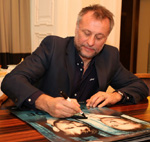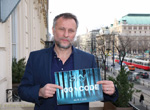|
Source: TVButler (Vienna Interview
regarding "100 Code")
Date: March 2015

When you read the script, what did
you think?
I had just filmed in New York, and I
talked to Bobby Moresco (director). There were different
versions and we talked about which one was the best one.
Basically, the plot has remained very similar. For my
role, I'm a cop who carries a lot of trouble with me.
I've seen too much horror, I've somehow lost control and
want to quit my job.
What fascinates you about "100 Code"?
What fascinated me was the complexity
of the story. It's not a simple crime story. There is a
lot going on, the blame, dealing with the family, the
murder cases and much more.

What does "100 code" actually
mean?
If you listen to the radio in New
York, for example, they would never say, "We have a
robbery, we have a murder," but they say "we have a 100
code."
What's the difference between a US cop and a Swede?
It depends on which cop you are in
the States. In the case of an investigative one, they
are more brutal than us. They shoot first and then ask
the questions. The Swedish cops are much more
conservative.
What do you think about America?
I lived in New York for six years.
And I noticed that they never asked me what I did,
always, what will I do next. With us, we must always be
prepared to be asked what we have done. We still have
such a class system here. They just do not have it there
in the States. America is such a money-bound country.
Money is what you talk about. It is difficult to talk
about having a king. But we have it now... In America,
the principle of materialism takes precedence. With
which action do I make the most money. That
differentiates us in the cultures. We in Sweden are
almost ashamed when we have to talk about money.

Can you learn anything from Hollywood
stars?
Yes, absolutely. There are many like
Willem Dafoe and William Hurt, who started like me with
theater, that is on stage. But most start as movie
actors. But there is a big difference. Something we do
not have. They have the "slow actor" method there -
Dustin Hoffman, William Hurt, Marlon Brando... We are
much more straightforward. Hollywood is sentimental and
we are more factually settled.
I read that as an orphan you went in search of your
biological parents. And you found them. Is searching an
integral part of your success in life and on the screen?
When I approach a character I have to
play, I naturally go back to my roots. Otherwise, there
would be nothing inside of me. But that is more of a
very existential question and to discuss that, we would
certainly need more than two hours. And we do not have
the time.
Then it is probably time to end the conversation. Many
thanks!


|